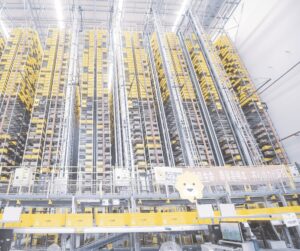
While the global fallout of the coronavirus is distressing, there is also hope. Companies around the world such as SSI Schaefer are leveraging tech to fight the pandemic, help businesses cope with the new normal and innovative strategies to empower their associates and communities.
The onset of the international pandemic for the most part in the first half of 2020 saw governments, companies and the public at large confront and corral the global Coronavirus challenge. In a relatively short span of weeks, national economies were upended and the global economy eventually ground virtually to a halt with draconian measures notably safe distancing and minimizing person-to-person contact firmly in place.
The scale, intensity and prevalence of the coronavirus crisis have reshaped society in permanent ways, from governance, the way we conduct our businesses, healthcare, the economy, our lifestyles, our travel plans and more. It has been a cataclysmic transformation in the way we comport ourselves and operate our companies. 
We now have the new normal, new SOPs (standard operating procedures), new protocols, new perspectives and a completely new playbook of rules and regulations in this completely transformed economic ecosystem and global business landscape.
So how are companies responding to this ubiquitous breakout that has consumed us all? As a test case and a snap shot of how large manufacturing and solution providers are functioning in a radically altered environment, Global Supply Chain conducted an exclusive and expansive interview with Matthias Hoewer, General Manager Middle East & Africa, SSI Schaefer, on a wide range of the pandemic issues and the company’s strategy to minimize the impact of the virus onslaught and tactical measures to bounce back.
Global Supply Chain (GSC): Briefly, what are key takeaways, broad observations and general comments of the Covid-19 pandemic from the SSI Schaefer corporate perspective?
Matthias Hoewer (MH): The rapidly spreading novel coronavirus has caused a situation that is hard to assess. However, we can control how we react.

To this end we established a Covid-19 taskforce right at the beginning of the crisis. Since then we have been coordinating closely with internal and external sources on a daily basis to assess the current situation and the consequences for our employees, our customers, and our company. As a team, we try to keep the impact on our company as low as possible.
GSC: How has the onset of the pandemic impacted your regional and global operations? And how can SSI Schaefer better contribute to ensure more streamlined operations to avert the impediments arising from the virus onset?
MH: On the one hand, we continue to support our customers with enquiries on current projects or consulting for new projects. Both activities are primarily done by phone or virtually using video conferencing to minimize the risk of infection. We already have a digital toolkit in place to plan customer systems in real time. 
With regards to our Customer Service & Support Department, we as a service organization are of course still available for our customers around the clock by phone, e-mail, and remote maintenance. Thanks to our predictive maintenance approach, which we have been promoting for years, many of our current systems are in perfect condition with proper technology in place. If a personal visit is necessary, our technicians will come to the customer’s site as long as it is permitted by and consistent with official regulations.
On the other hand, as SSI Schaefer, we are also part of the supply chain. We continuously check our processes along the supply chain for their functionality to ensure business continuity.
We are in close contact with our global production teams and re-evaluate the situation based on the latest news to implement quick countermeasures. In case we incur changes within our supply chain, we will develop suitable measures to minimize the risk. Due to strengthened prevention measures, including closed borders in different countries, deliveries to our factories or from our factories to customers may experience a delay. Our task force is always involved and tries to find a fast solution in close cooperation with respective internal departments and customers.
More of this article can be found on www.globalsupplychainme.com






